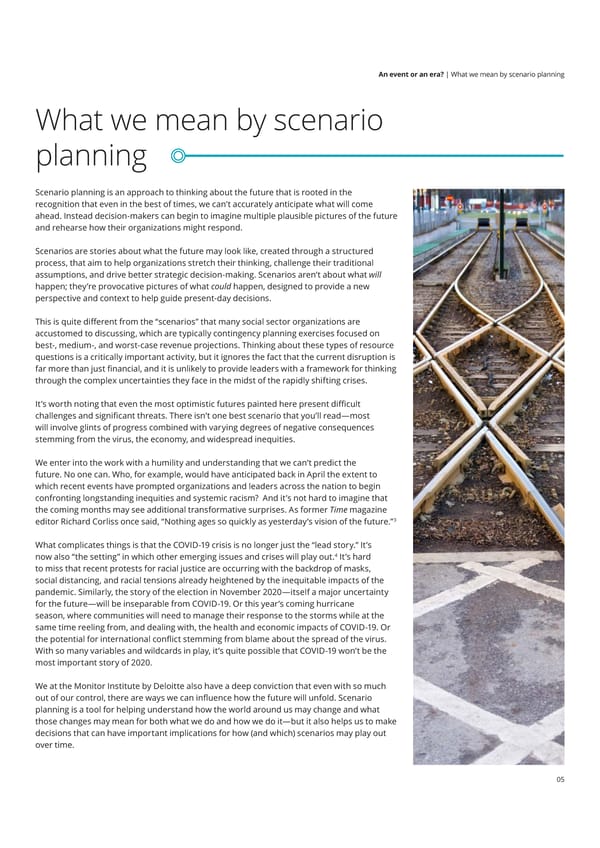An event or an era? | What we mean by scenario planning What we mean by scenario planning Scenario planning is an approach to thinking about the future that is rooted in the recognition that even in the best of times, we can’t accurately anticipate what will come ahead. Instead decision-makers can begin to imagine multiple plausible pictures of the future and rehearse how their organizations might respond. Scenarios are stories about what the future may look like, created through a structured process, that aim to help organizations stretch their thinking, challenge their traditional assumptions, and drive better strategic decision-making. Scenarios aren’t about what will happen; they’re provocative pictures of what could happen, designed to provide a new perspective and context to help guide present-day decisions. This is quite different from the “scenarios” that many social sector organizations are accustomed to discussing, which are typically contingency planning exercises focused on best-, medium-, and worst-case revenue projections. Thinking about these types of resource questions is a critically important activity, but it ignores the fact that the current disruption is far more than just financial, and it is unlikely to provide leaders with a framework for thinking through the complex uncertainties they face in the midst of the rapidly shifting crises. It’s worth noting that even the most optimistic futures painted here present difficult challenges and significant threats. There isn’t one best scenario that you’ll read—most will involve glints of progress combined with varying degrees of negative consequences stemming from the virus, the economy, and widespread inequities. We enter into the work with a humility and understanding that we can’t predict the future. No one can. Who, for example, would have anticipated back in April the extent to which recent events have prompted organizations and leaders across the nation to begin confronting longstanding inequities and systemic racism? And it’s not hard to imagine that the coming months may see additional transformative surprises. As former Time magazine editor Richard Corliss once said, “Nothing ages so quickly as yesterday’s vision of the future.”3 What complicates things is that the COVID-19 crisis is no longer just the “lead story.” It’s 4 now also “the setting” in which other emerging issues and crises will play out. It’s hard to miss that recent protests for racial justice are occurring with the backdrop of masks, social distancing, and racial tensions already heightened by the inequitable impacts of the pandemic. Similarly, the story of the election in November 2020—itself a major uncertainty for the future—will be inseparable from COVID-19. Or this year’s coming hurricane season, where communities will need to manage their response to the storms while at the same time reeling from, and dealing with, the health and economic impacts of COVID-19. Or the potential for international conflict stemming from blame about the spread of the virus. With so many variables and wildcards in play, it’s quite possible that COVID-19 won’t be the most important story of 2020. We at the Monitor Institute by Deloitte also have a deep conviction that even with so much out of our control, there are ways we can influence how the future will unfold. Scenario planning is a tool for helping understand how the world around us may change and what those changes may mean for both what we do and how we do it—but it also helps us to make decisions that can have important implications for how (and which) scenarios may play out over time. 05
 US Deloitte Monitor Institute Page 4 Page 6
US Deloitte Monitor Institute Page 4 Page 6